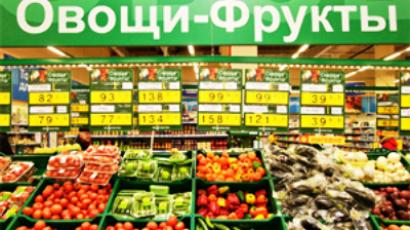Families braced for recession
Despite its huge oil wealth, Russia is facing the effects of the global economic downturn. Unemployment has gone up by 20 per cent in the last four months. But some are hoping to benefit from falling house prices.
In Moscow, the official number of people without work and claiming benefit is just 3,000, – up from 2,400 in October. That’s a staggeringly low figure for Europe’s biggest city.
Of course the unofficial figure is much higher, and is expected to grow massively in 2009.
To combat the growing problem of unemployment, the government is allocating more than a billion dollars for regional job creation programmes.
Aleksey Pavlov is out of work. He hopes a government-funded job initiative will help.
“Since December I have been looking for work and I can honestly say it’s getting more and more difficult to find it,” Aleksey said.
Aleksey’s case is not unique. More and more people in Russia are expected to turn to the government to pull them out of a hole.
For some the recession comes with a silver lining.
The Frolov family wear big smiles. But the limited amount of space in their one-bedroom apartment in Moscow constricts their style. The flat doubles as a playground, a gymnasium and everything else.
They urgently need more room. But finding a new apartment in Moscow is not for the faint of heart.
That said, the financial crisis has driven property prices down. So now could be the time to buy a bigger place.
“We are lucky because the crisis is working in our favour. Real estate prices are falling and quickly – for years it was the other way round,” Maria Frolova says.
With Russia’s sky-high mortgage rates, the Frolovs knew borrowing from a bank wasn’t an option. But through a combination of savings, a programme called maternity capital, and selling what they have, the family’s dream of more space could come a reality.
“Maternity capital is a one-time sum given to mothers who have two or more children. And we can use that to help buy a new apartment,” Maria Frolova says.
But everyone isn’t so lucky.
Economists say most ordinary Russians haven’t yet been hit by the downturn. But they warn that a big hit is coming.
“Car loans, mortgages, consumer loans are all there and Russians will really suffer. Russians will have to adjust their consumption level and many Russians will lose their jobs,” predicted the head of Moscow’s New Economic School, Sergey Guriev.
Kick-starting the car industry
As in Europe and the U.S., the car-making industry in Russia is among the areas worst hit by the economic downturn.
But the government has come up with a package of measures to support it. At the end of 2008 ministers pledged to give 175 billion roubles (about $5 million) to help get the domestic car industry through the crisis.
Also, low interest rates loans are available for people to buy Russian-made cars.
On Saturday, the country’s majority United Russia party organised a rally in Moscow in support of domestic car producers.
But not everybody is happy. Ministers have imposed higher taxes on imported cars, now very popular among Russians.
This increase in duties didn’t go down well in Russia’s Far East, where many make a living from cheap Japanese-made vehicles.
In December, protesters in Vladivostok demanded the scrapping of a new law meant to boost Russia’s domestic car industry.














